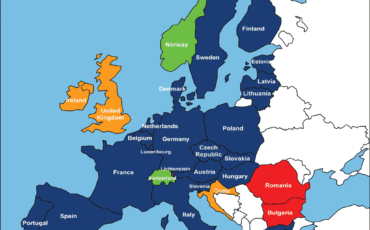Di Philippe Uzan, chief investment officer di Edmond de Rothschild Asset Management
WHAT’S AT STAKE IN THE UK’S JUNE 23 REFERENDUM? The consequences of Brexit for the Europe
● Brexit
Given the concessions granted by the EU to David Cameron in February, a UK exit would be an even
bigger sign of failure. It would also constitute a symbolic if somewhat ambiguous precedent.
In all cases, Brexit would fuel significant confusion and uncertainly but everything will depend on
subsequent decisions. The consequences for the EU are manageable. The UK is the zone’s second largest
economy, representing 16% of GDP compared to 21% for Germany and 15% for France. Most importantly,
44% of the UK’s trade is with the EU whereas only 8% of EU exports go to the UK. Intermediate British
products like chemicals represent 15% of the value of total EU exports.
The EU has less to lose than the UK and it would be in Brussels’ best interests to adopt a tough position
(anti-British sentiment could well increase). In any post-exit negotiations, the EU would make the UK pay
dearly for its decision. At the same time, Brexit might initially reinforce the Euroscepticism which is fuelling
the rise of populist parties. But the actual consequences of the UK leaving might subsequently prove
dissuasive for Eurosceptics.
● Non-Brexit
If the UK votes to stay, the consequences of David Cameron’s political gamble will probably have a
significant impact on how the Union is run. The concessions he skilfully obtained at the Brussels summit
have undermined the Union by opening the door to an à la carte Europe. Europe’s Eurosceptic parties are
gaining ground almost everywhere on the continent and the democratic exercise embodied in a referendum
on EU membership might provide them with an emblem.
In fact, the Union has two weak points. It suffers from institutional complexity that citizens find very hard to
understand. And although the EU has promoted growth and stability, it has failed to curb inequality between
countries and among their populations. In Scandinavia countries and in Germany, Austria and the UK
which are enjoying better growth, populist and nationalistic sentiment is thriving among people who feel left
out and because upbeat economic conditions are acting as a magnet for migrants. And in countries which
have been hit harder by the financial crisis, recent budgetary and fiscal policies have seriously undermined
perceptions of Europe as a force for good.
Conclusion
As in other EU countries, public opinion on Europe has polarised and gone beyond traditional divisions. As
a result, domestic policy issues should not have a decisive influence on voting. But voters are facing the
possibility of a huge leap in the dark and a decision that will probably be impossible to reverse for some
considerable time. According to the Number Cruncher in Politics site, which analyses opinion polls, the probability of Brexit has fallen below 20%. Campaign momentum is generally going against the Brexit camp and this helps
explain why sterling has rallied. Lack of clarity on the fundamental consequences of leaving the EU could
well put off voters who are keen to understand what exactly is at stake. Voters are dissatisfied with vague
indications that negotiations will follow with the EU in the aftermath of a vote for Brexit. For undecided
voters, the path of least resistance will not result in Brexit as their lack of conviction will push them towards
the status quo. Unforeseen events over the short term could, of course, influence the vote at the last
minute. Voters are never motivated by rational considerations alone but the emotional factors at play today
do not look strong enough to secure a majority vote for disruption and uncertainty.
At the peak of the sovereign debt crisis, we were convinced the euro would survive because it represented
a political project. The risk of a Europhobic party coming to power in a EU country will continue to be a
source of volatility in coming years. A vote to stay in the EU would be a signal that centrifugal forces are not
always as powerful as we might fear. And it would also be a welcome lift for the EU




